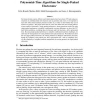Free Online Productivity Tools
i2Speak
i2Symbol
i2OCR
iTex2Img
iWeb2Print
iWeb2Shot
i2Type
iPdf2Split
iPdf2Merge
i2Bopomofo
i2Arabic
i2Style
i2Image
i2PDF
iLatex2Rtf
Sci2ools
AAAI
2010
2010
Bypassing Combinatorial Protections: Polynomial-Time Algorithms for Single-Peaked Electorates
For many election systems, bribery (and related) attacks have been shown NP-hard using constructions on combinatorially rich structures such as partitions and covers. It is important to learn how robust these hardness protection results are, in order to find whether they can be relied on in practice. This paper shows that for voters who follow the most central politicalscience model of electorates--single-peaked preferences--those protections vanish. By using single-peaked preferences to simplify combinatorial covering challenges, we show that NPhard bribery problems--including those for Kemeny and Llull elections--fall to polynomial time. By using single-peaked preferences to simplify combinatorial partition challenges, we show that NP-hard partition-of-voters problems fall to polynomial time. We furthermore show that for single-peaked electorates, the winner problems for Dodgson and Kemeny elections, though p 2-complete in the general case, fall to polynomial time. And we completely...
| Added | 29 Oct 2010 |
| Updated | 29 Oct 2010 |
| Type | Conference |
| Year | 2010 |
| Where | AAAI |
| Authors | Felix Brandt, Markus Brill, Edith Hemaspaandra, Lane A. Hemaspaandra |
Comments (0)

